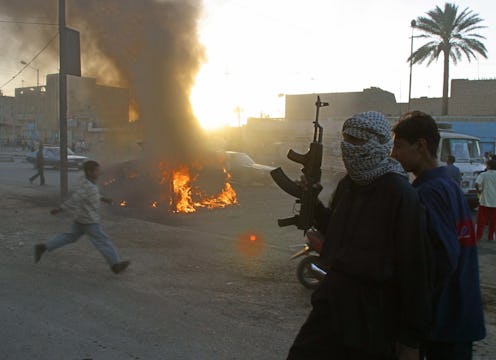News
What Does ISIS' Name Mean?
The name ISIS is well known by itself — now more than ever, as the group claims responsibility for the series of terror attacks in Paris last Friday. But what does ISIS' name actually stand for? It's simply an abbreviation for "Islamic State in Iraq and Syria," but there's some confusion, since the extremist group often uses many other names, including the Islamic State, Daesh, and ISIL, all of which have given rise to some controversy.
Many world leaders avoid referring to ISIS and its holdings as the Islamic State, because the name has been construed as an attempt to brand the organization as a legitimate state, erasing physical boundaries in the Middle East and forcing people to recognize Iraq and Syria as one. "There is no Iraq and Syria, no Egypt or any other country that we know. They want it all to be one undifferentiated Islamic state," David Pollock of the Washington Institute for Near East Policy told Religion News. Similarly, the "L" at the end of ISIL stands for "Levant," which represents the entire region east of the Mediterranean, from Egypt to Turkey. The U.S. government often uses ISIL, which shows an understanding of the caliphate's overarching goal to expand beyond Iraq and Syria.
Since the Paris attacks, ISIS' nickname of Daesh has been seeing more reference on an international stage, especially from France and the United States. The name is said to offend ISIS' leaders, since it's an acronym of the group's Arabic name, Dawlat al-Islamiyah f'al-Iraq wa al-Sham. Daesh has been adapted by Secretary of State John Kerry, and more recently, President Obama. According to Religion News, "'Daesh' has allowed Arabic speakers to play with the name in pejorative ways, because it sounds like or rhymes with many words that have negative connotations — 'daes,' for example, which means someone who tramples something underfoot, or 'dahes,' the Arabic word for 'sower of discord.'"
In the media, the group largely remains referred to as ISIS, the name it identifies with, as a means of neutral reporting. But some analysts believe that using the name Daesh, rather than ISIS, has hurt the group's legitimacy. Although the caliphate is best known as ISIS at this point, world leaders referring to the group as Daesh could change this. This past January, former Australian prime minister Tony Abbott stated, "What [ISIL doesn't] like has an instinctive appeal to me," and he could have a pretty important point.
ISIS' names all have different but seriously important implications in the way the extremist group is perceived in culture and national and international policy. And although the meaning behind the name ISIS remains fairly simple, the full connotations of its other names are still mysterious.
